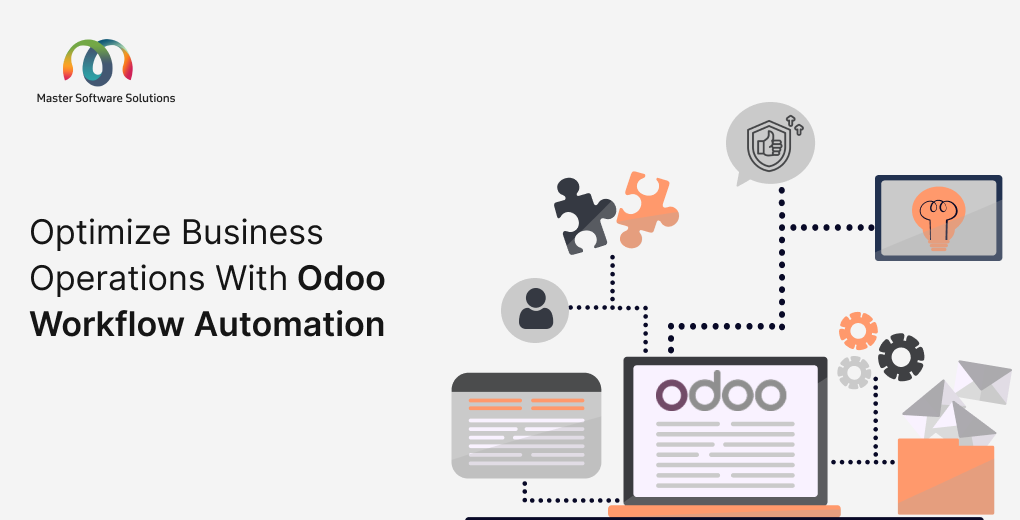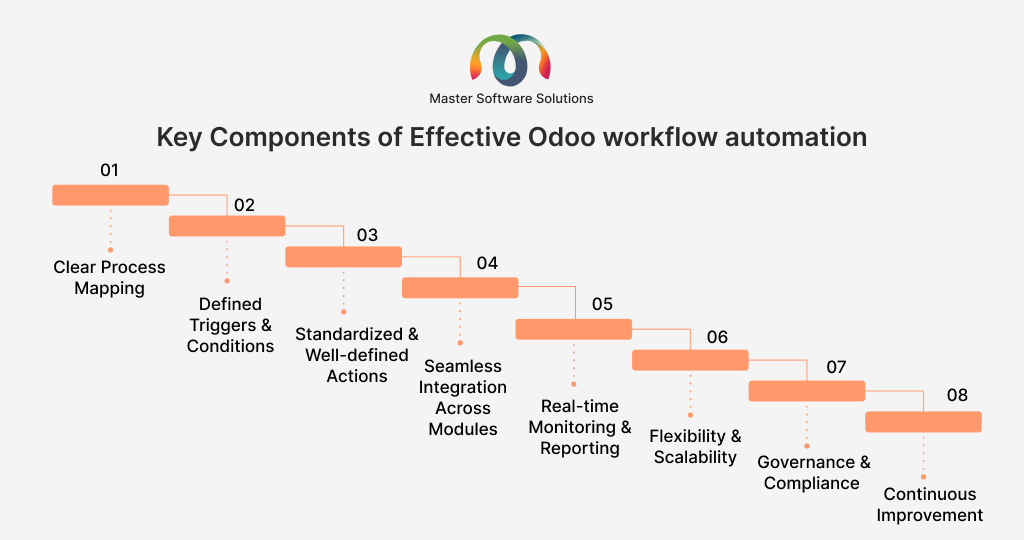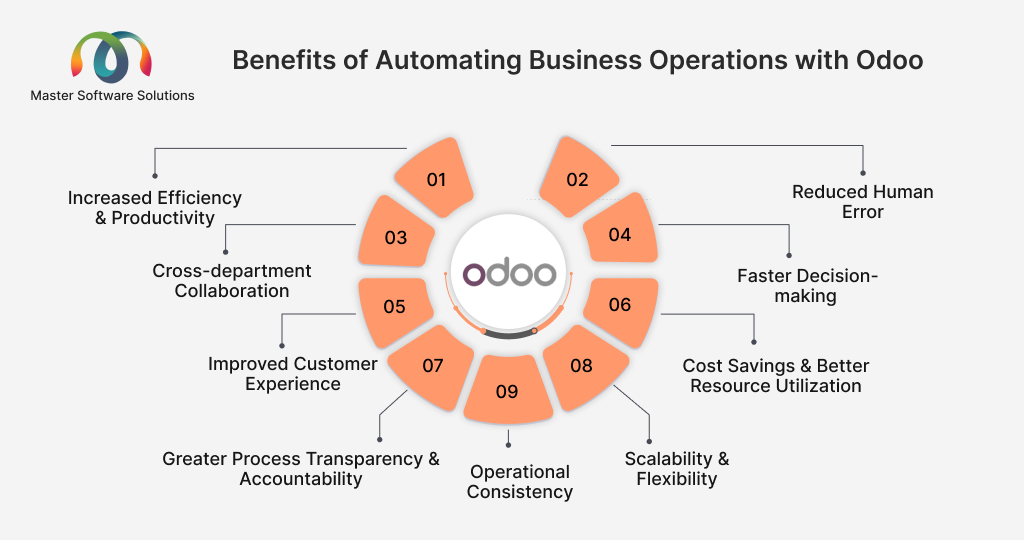Automation has become key to efficiency. Businesses are increasingly adopting automation to eliminate repetitive tasks, reduce errors, and enhance productivity. Odoo, an integrated enterprise resource planning platform, offers powerful automation tools that streamline operations across all your departments.
Implementing Odoo workflow automation can help businesses optimize processes, improve collaboration, and focus on what truly drives growth: innovation and customer satisfaction.
Table of Contents
Basics of Odoo workflow automation
Odoo Workflow Automation is designed to simplify and standardize routine business processes. This work involves automatic triggering actions based on defined conditions or events, helping businesses save time, reduce manual intervention, and ensure consistency across operations.
At the core, Odoo Workflow Automation works through rules, triggers, and actions:
- Triggers – Events that start an automated workflow (for example, a new sales order is confirmed or an invoice is validated).
- Conditions – Logical rules that determine whether an action should occur (for example, only if payment is received or stock is available, should a certain action be performed).
- Actions – The automated tasks performed (for example, send an email, create a task, update a record, or move an order to the next stage).
These workflows can be applied to multiple Odoo ERP modules, including CRM, Sales, Inventory, HR, and Accounting, allowing businesses to build seamless, end-to-end automation. This enables faster task completion, better accuracy, and improved collaboration across teams.
Key components of effective workflow automation
Implementing Workflow Automation in Odoo isn’t just about setting up triggers and actions; it’s about designing a system that supports your business goals, scales with your growth, and enhances team productivity. Here are the components that form a solid foundation for an effective automation strategy:
Clear process mapping
Before you automate a process, it is essential to have a clear understanding of how your current workflows function. Map out each process step, from initiation to completion, to identify repetitive tasks, dependencies, and potential bottlenecks. This helps determine which tasks can be automated and ensures that automation supports, rather than disrupts, existing operations. In Odoo, process mapping can reveal opportunities to connect modules for smoother cross-departmental workflows.
Defined triggers and conditions
Every automation begins with a trigger, an event that starts the workflow, and a condition, a logical rule that determines if the automation should proceed. For instance:
- Trigger: A customer confirms an order.
- Condition: The customer’s payment is received.
- Action: The system automatically generates a delivery order and sends a confirmation email.
This logical structure ensures automation only when appropriate, maintaining accuracy and preventing redundant or premature actions.
Standardized and well-defined actions
Automated actions are the heart of workflow automation. These include sending notifications, updating records, creating tasks, generating invoices, or escalating issues. Each action should follow a consistent and predictable pattern, enabling users to understand what happens at each stage. In Odoo, these actions can be applied across modules. For example, sales automatically inform inventory, or HR approvals instantly notify accounting.
Seamless integration across modules
One of Odoo’s advantages is its modular architecture. For workflow to be effective, data must flow effortlessly between departments and systems. Integration between odoo modules such as Sales, CRM, Inventory, Accounting, and HR ensures that each process stage is automatically updated without manual input. For example, when a sales order is validated, stock levels can adjust, invoices can be generated, and accounting entries can be updated automatically, all through connected automation.
Real-time monitoring and reporting
Businesses monitor automated processes to ensure they are running smoothly and achieving desired results. Odoo’s dashboard and reporting tools enable users to track workflow efficiency, identify slow points, and review system-generated logs. This real-time visibility helps businesses optimize and refine automation continuously for better outcomes.
Flexibility and scalability
Business processes evolve with time. An effective workflow automation system must be adaptable to new business models, departments, or market changes. Odoo enables administrators to modify automation rules, including adding new conditions, changing triggers, or extending workflows to new modules. This adaptability ensures that your automation grows in tandem with your business, eliminating the need to rebuild it entirely.
Governance and compliance
While automation enhances efficiency, it is important to ensure that automated actions comply with company policies and industry regulations. Defining clear approval hierarchies, access control, and audit trails within odoo helps maintain transparency and accountability, especially for critical operations like financial approvals or HR workflows.
Continuous improvement
Automation should remain static. Regularly reviewing performance data and user feedback helps identify gaps and opportunities for improvement. Odoo makes it easy to adjust workflows according to changing business requirements, ensuring automation continues to deliver measurable value over time.
Features of Odoo workflow automation
The Odoo ERP system offers features that help businesses automate operations. Odoo Workflow Automation is built to simplify complex business processes through smart, rule-based automation that minimizes manual effort and enhances operational efficiency. Its flexibility, modular integration, and user-friendly design make it a powerful tool for businesses of all sizes. Here are the key features that make Odoo Workflow Automation so effective.
Rule-based triggers and actions
Osoo enables users to set up automated workflows based on specific triggers (events) and actions. For example, when a quotation is approved (trigger), an invoice can be generated automatically (action). These rules can be customized to fit any business process, ensuring precise control and consistency across departments.
Multi-step workflow design
You can create multi-level workflows that move records through several stages, such as sales approvals, inventory checks, and shipping confirmations, without manual intervention. This helps standardize complex business processes and ensures that every task follows a predefined, error-free path.
Seamless module integration
Odoo’s biggest strength lies in its fully integrated ecosystem. Workflow automation connects seamlessly across modules, including Sales, CRM, Accounting, HR, Inventory, and Manufacturing. For instance, confirming a sales order can automatically trigger stock movement, invoicing, and delivery.
Email and notification automation
Communication is automated through system-generated emails, pop-up alerts, and in-app notifications. You can configure Odoo to automatically send order confirmations, payment reminders, task updates, or approval requests, keeping teams and customers informed at every step.
Conditional logic
Odoo allows you to set conditional rules to define when a specific action should occur. For example, a discount approval workflow might only trigger if an order exceeds a certain value. This adds intelligence and control, ensuring automation aligns with business policies and priorities.
Record updates and task creation
Workflows can automatically update data fields, create follow-up tasks, or assign responsibilities to team members. This ensures data accuracy and up-to-dateness so that no task is overlooked or delayed.
Time-based automation
Odoo supports scheduled or time-based automation, which is ideal for recurring tasks such as sending monthly reports, following up on unpaid invoices, or updating project statuses at specific intervals.
Approval workflows
Automated approval hierarchies can be configured for operations like purchase orders, expenses, or leave requests. These workflows ensure that approvals adhere to organizational rules, thereby maintaining accountability and compliance.
Visual workflow builder
Odoo’s workflow interface offers a visual representation of automation paths, allowing users to design, monitor, and adjust workflows. This no-code environment empowers non-technical users to build automations without relying on developers.
Logs, tracking, and auditing
Each automated workflow in Odoo maintains detailed logs of activities, showing who triggered what, when, and how. This ensures full transparency and simplifies auditing for compliance and performance monitoring.
Scalability and customization
Workflows in odoo can easily scale as your business grows. Whether you need to add a new approval layer, integrate third-party tools, or automate new departments, Odoo’s modular structure supports continuous expansion.
Error handling and retry mechanism
To ensure reliability, Odoo includes mechanisms to handle failed actions, such as retries or manual intervention alerts, so that no critical process is left incomplete due to system or data errors.
Benefits of automating business operations with Odoo
Odoo automates business operations, empowering businesses by eliminating manual work, increasing efficiency, and enabling smarter decisions through real-time data visibility. Connecting departments and automating repetitive workflows enables organizations to operate more intelligently and respond quickly to change. Here are the key benefits:
Increased efficiency and productivity
Automation minimizes manual tasks, such as data entry, order validation, or invoice creation, allowing employees to focus on high-value activities. Processes such as sales approvals, inventory updates, and customer communication can run automatically, significantly reducing turnaround times.
Reduced human error
Manual operations are prone to mistakes, especially when managing larger data volumes. Automated workflows ensure consistency and accuracy by executing tasks based on predefined rules, preventing common errors such as duplicate entries, missed approvals, or incorrect calculations.
Enhanced cross-department collaboration
Odoo’s modular design enables seamless integration across departments, including Sales, Inventory, Accounting, HR, and more. When one department updates data, the information automatically syncs across all relevant modules, ensuring that every team works with accurate, real-time data.
Faster decision-making with real-time insights
Automation not only speeds up processes but also provides managers with immediate visibility into business performance. With Odoo’s analytics and dashboard, decision-makers can track key metrics, monitor workflow progress, and make informed decisions without delays.
Improved customer experience
Automating order confirmations, follow-up emails, and support tickets, businesses can provide customers with quick, consistent, and professional service. Faster response times and accurate updates enhance customer trust and satisfaction.
Cost savings and better resource utilization
Automation reduced the need for manual labor and repetitive administrative tasks, lowering operational costs. Odoo allows employees to focus on strategic, revenue-generating tasks rather than routine tasks, optimizing resource allocation.
Greater process transparency & accountability
Automated workflows in Odoo create a clear audit trail of actions, approvals, and status updates. This transparency improves accountability, helps monitor employee performance, and ensures compliance with internal policies and external regulations.
Scalability and flexibility
As your business grows, Odoo allows you to easily expand or adjust automated workflows to accommodate new processes, departments, or integrations. Its modular and customizable structure ensures your automation strategy evolves with your organization.
Operational consistency
Automation ensures that every process, from order fulfillment to financial reporting, follows the same standardized steps. This consistency improves output quality, strengthens brand reliability, and simplifies employee training.
Automating your business processes with Odoo ERP – Master Software Solutions
Master Software Solutions is a certified Odoo partner that offers end-to-end Odoo consulting services and helps businesses to seamlessly implement, configure, develop, and migrate from legacy systems. We build custom Odoo solutions to cater to unique business requirements for various industries, including bottled water, coffee, dairy, manufacturing, retail, and distribution. If you are a business looking to implement the Odoo system to automate workflows, contact us.


